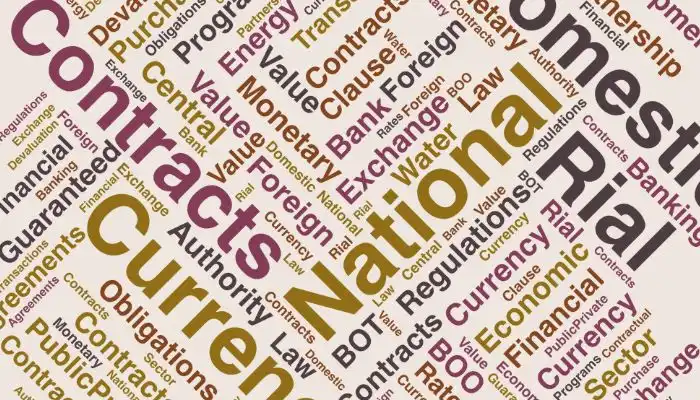The value of a country’s national currency is directly related to the acceptance of that currency within the geographical area of its issuer. Therefore, the currency of any country is established as the only authorized tool for facilitating exchanges, preserving economic value, and serving as a standard of measure within the geographical boundaries of that country.
It is evident that maintaining and strengthening the value of a national currency does not equate to simply decreeing and announcing the exchange rates of foreign currencies against the national currency by monetary authorities, specifically the central bank of each country, and controlling its undesirable fluctuations in the short term. This merely provides an image of the efficiency or inefficiency of the central bank’s monetary policy and does not necessarily reflect the effectiveness of the bank in fulfilling its prescribed duties and responsibilities. This issue requires an examination of the bank’s performance in supervisory areas.
The gradual and widespread acceptance of payment obligations in any currency other than the Rial in our country signifies a decline in the acceptance and capability of the national currency as a tool for facilitating exchanges, preserving economic values, and serving as a standard for measuring the value of goods and services.
This article addresses domestic currency contracts and some noteworthy aspects of them from the perspective of monetary and banking laws.
1. According to Clause (a) of Article 1, Part One of the Monetary and Banking Law of the country, “The unit of currency in Iran is the Rial.”
2. According to Clause (c) of Article 2, Part One of the same law, “The payment of any debt or obligation is only permissible in the national currency unless another arrangement is made between the debtor and creditor in compliance with foreign exchange regulations.” In other words, entering into financial obligation contracts within Iran is permissible and mandated in Rials, except in specific cases where explicit foreign exchange regulations exist or are issued.
3. According to Clause (c) of Article 11, Chapter Two, Part Two of the same law, “Regulating the provisions related to foreign exchange transactions and the undertaking or guaranteeing of foreign exchange payments with the approval of the Money and Credit Council, as well as supervision over foreign exchange transactions,” is among the duties and powers assigned to the Central Bank.
Therefore, specific regulations from the Central Bank are necessary for the conclusion of foreign currency contracts between individuals residing in Iran, whether they are governmental, public, or private entities. These regulations logically need to consider the resources and expenditures, the provision, allocation, and settlement of foreign currency for domestic contracts made in foreign currencies in such a way that they do not impact the country’s foreign exchange receipts and payments, affect the supply and demand for foreign currency, and consequently lead to changes in the value of the national currency. This is because such foreign currency expenditures are not directly related to the foreign currency needs for the import of goods, services, and capital, and should not, in aggregate, create excessive demand that results in the devaluation of the national currency.
Currently, a significant volume of transactions and contractual agreements between governmental, public, and private entities are being concluded in foreign currencies, and the payment of debts or liabilities arising from such contracts can be executed and settled in foreign currencies according to their terms.
Among these types of contracts, one can refer to BOO (Build-Own-Operate) and BOT (Build-Operate-Transfer) contracts in the water and energy sectors, which are concluded between domestic investors and beneficiaries. Examples include contracts related to desalination projects and contracts for renewable power plant projects. Regardless of the considerations in the structure and nature of such contracts compared to their standard structure within the framework of Public-Private Partnership (PPP) contracts, the guaranteed purchase of the final product from the project investor is committed to be in foreign currency. This ensures that the domestic investor’s returns are not affected by increasing fluctuations and the depreciation of the national currency at the time of the purchase finalization and fulfillment of guaranteed purchase contractual obligations.
In the legal documents for such contracts, such as Clause (b) of Article 34 of the Permanent Provisions of the Country’s Development Programs Law, Clause (t) of Article 48 of the Sixth Development Plan Law, Clause (d) of Article 133 of the Fifth Development Plan Law, Section 2 of Clause (t) of Article 3 of the Executive Regulations of Note 19 of the Single Article of the Budget Law of 2018, Clause (a) of Article 1 of the Instruction for Determining the Guaranteed Purchase Rate of Electricity, subject of Clause (t) of Article 48 of the Sixth Five-Year Development Plan Law, etc., there is no mention of foreign exchange regulations that would authorize the conclusion, execution, and settlement of such contracts in foreign currency.
Therefore, it seems that no specific regulations have been issued by the Central Bank regarding this matter, and entering into such contracts in foreign currency conflicts with Clause (c) of Article 2, Part One of the Monetary and Banking Law of the country.
On the other hand, currently, many domestic contracting agreements also determine the employer’s settled claims at maturity in foreign currency by evaluating the costs in foreign currency. It seems that demanding costs that are sometimes even in Rials in foreign currency and creating a payment obligation or debt under these contracts in foreign currency, regardless of the possibility of settlement at the time of payment in equivalent Rial terms, is in contradiction with the Monetary and Banking Law of the country.
The practice of concluding contracts in foreign currencies is not limited solely to the aforementioned cases. Therefore, a thorough field study is necessary to understand the volume of such foreign currency contracts and the amounts of foreign currency under obligation.
In any case, with the substitution of the national currency by the currencies of other countries and the creation of obligations and the payment of debts in foreign currencies in domestic contracts—regardless of whether the settlement is conducted in foreign currency at maturity or in Rials equivalent to the highest exchange rate specified in the contract—should this practice become widespread in other transactions, gradually other currencies will replace the Rial. This will alter the issue of maintaining the Rial’s value against other currencies, which is a core responsibility of the Central Bank. It will also expedite and facilitate the demise of the Rial and the transition to any foreign currency with internal acceptance as the new national currency.
It should be noted that the national currency represents the value, authority, and dignity of a nation. It seems that with the continuation of these practices, this authority and dignity will be normalized and become widespread, and either inadvertently or deliberately, the national currency will be diminished and devalued.




